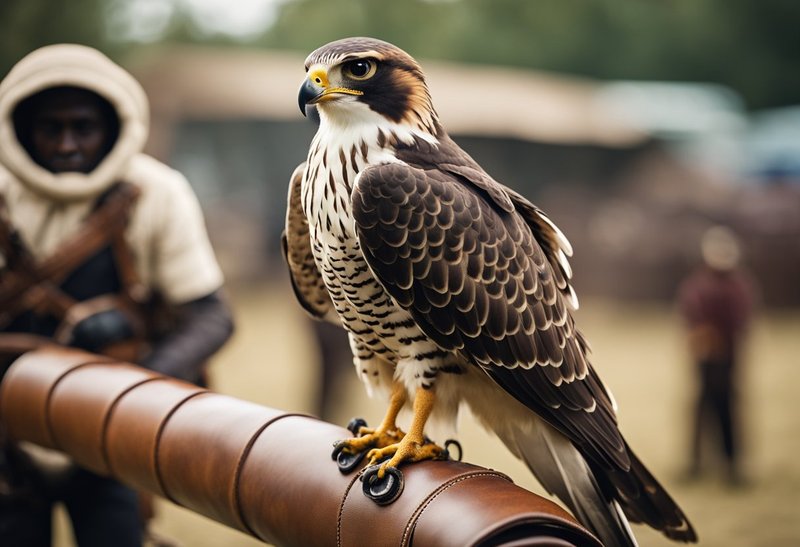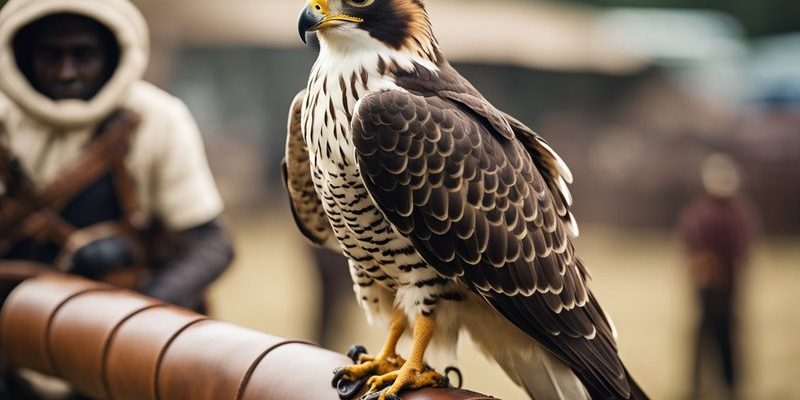
Falcons aren’t just fascinating creatures; they hold a significant place in human culture. From ancient Egypt, where they were worshipped as symbols of the sun god Horus, to Native American tribes that consider them powerful spirit animals, these birds have woven themselves into the fabric of human expression and belief. If you’re curious about how falcons have been represented through myths, legends, and art, let’s dive deeper into their cultural significance.
Falcons in Mythology: Ancient Egypt
In ancient Egypt, the falcon was more than just a bird; it was a potent symbol of divinity. The god Horus, depicted with a falcon’s head, represented the sky and kingship. Egyptians believed Horus protected the pharaohs, guiding them in battle and ensuring their well-being. The connection was so strong that falcons were often mummified and buried with great honor. This practice reflected the belief that the falcon could carry the pharaoh’s soul to the afterlife.
Here’s the thing: Egyptians saw the falcon as a symbol of duality—representing both the sun and the moon. This duality suggested that life is a balance of light and dark. Statues, carvings, and artwork from that era frequently feature falcon imagery, serving as reminders of the bird’s connection to the gods. It’s no wonder that falcons maintain such a revered status in historical contexts, embodying power and protection.
Falcons in Native American Culture
For many Native American tribes, the falcon is a revered spirit animal. Each tribe may have a unique interpretation of the falcon’s role, but generally, it symbolizes keen vision, agility, and intelligence. The falcon is often viewed as a messenger, bridging the gap between the spiritual and physical worlds.
Take the Pueblo tribes of the Southwest, for instance. They consider the falcon sacred and believe it represents a guardian spirit. They might tell stories of warriors who seek guidance from falcons before embarking on a quest, emphasizing the bird’s role as a guide and protector. The belief is that the falcon’s keen eyesight enables it to see beyond the ordinary, offering clarity and insight to those who seek help.
Falcons in Literature and Art
Falcons have not only fluttered through mythology and folklore but have also left their mark on literature and art. Renowned works, like *The Canterbury Tales* by Geoffrey Chaucer, feature falcons prominently, portraying them as symbols of nobility and grace. These literary references often reflect human qualities—cunning, agility, and an unyielding spirit.
In visual arts, artists have depicted falcons in various forms—from paintings to sculptures. One striking example is the portrayal of falcons in medieval heraldry, where they symbolize bravery and loyalty. This imagery has continued to inspire modern artists who use falcons to convey themes of freedom and power.
If you’ve ever seen a striking falcon painting, you might have noticed how the artist captures its fierce gaze or elegant posture. It’s this blend of power and beauty that resonates with people across cultures, serving as a source of inspiration and admiration.
Falcons in Global Folklore
The presence of falcons extends beyond Western cultures; they appear in various forms of folklore around the world. In Persian mythology, for example, falcons are often depicted as protectors of the realm. They are seen as creatures that help maintain balance in nature, symbolizing justice and strength.
In Japanese culture, the falcon is connected to the samurai, representing courage and loyalty. There are even traditional sports, like falconry, which emphasize the bond between humans and these magnificent birds. This practice requires skill and patience, mirroring the respectful relationships forged between falconers and their birds throughout history.
All these varied representations deepen our understanding of falcons in different contexts. They showcase how a single creature can have diverse meanings across cultures, enriching our collective human experience.
The Symbolism of Falcons Today
Today, falcons continue to symbolize various concepts across cultures. They represent freedom due to their incredible flight abilities, inspiring those who yearn for independence. Many countries have chosen the falcon as a national emblem, symbolizing strength and resilience—qualities that resonate deeply in modern societies.
In addition to being national symbols, falcons are also present in sports teams and organizations. Their fierce nature and swift movements make them a popular choice for mascots. For instance, the Atlanta Falcons football team uses the bird as a representation of agility and competitive spirit, connecting their players and fans to the qualities of the falcon.
Honestly, it’s inspiring to see how falcons have adapted to modern symbols while still holding onto their rich historical roots. They remind us of the qualities we strive to embody—courage, vision, and the desire to rise above challenges.
Personal Reflections on Falcons
Reflecting on falcons and their cultural significance can lead to personal insights, too. Maybe you’ve noticed that when people speak of falcons, they often use words like “freedom” or “strength.” It’s intriguing how the falcon embodies qualities we all admire and aspire to in our lives.
Think about how you might relate to a falcon. Do you see yourself as someone who seeks clarity in difficult times, much like a falcon soaring above the chaos? Or perhaps you resonate with the idea of being a guide or protector for someone you care about. Falcons remind us that we can all strive for greater heights, just as they do when they take to the skies.
As we explore cultural representations, we can learn not just about the falcon itself but also about our shared values and aspirations. In many ways, the falcon serves as a mirror reflecting our own journeys, ambitions, and the strength we hold within.
The representation of falcons in culture and folklore is vast and varied, reflecting a shared human admiration for their grace and power. From ancient Egypt and Native American tribes to modern art and literature, the falcon symbolizes courage, freedom, and insight.
As we ponder these incredible birds, we find that they connect people across cultures and time. They remind us of the beauty of nature and the strength we all possess. Whether we see them soaring in the sky or hear stories of their prowess, falcons continue to inspire and captivate our imaginations.
So, the next time you spot a falcon high above, take a moment to appreciate the rich tapestry of meanings it holds in our world. Remember, it’s not just a bird; it’s a symbol of our aspirations and a reminder of the heights we can reach.

